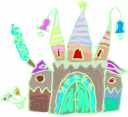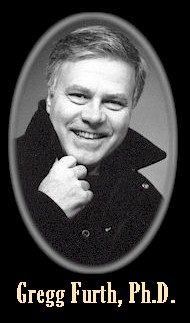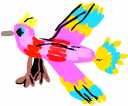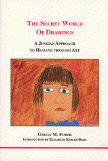
|
|
The
Secret World of Drawings: by
|
This course meets the qualifications for 10 hours of continuing education units
The Secret World of Drawings begins with the premise that drawings
are an expression of the unconscious. Referring to the works of C.G. Jung,
Susan Bach, the House-Tree -Person and Kinetic Family Drawings, Jungian Analyst
Gregg Furth creates a new and dynamic way to look at spontaneous drawings.
Furth's teaching of how to collect and then interpret drawings are a must
for any child therapist, anyone working in the art therapy field, as well
as those in the medical and healing professions. Cases and vignettes include
adults who are interested in exploring the unknown realms within themselves,
as well as those who are ill or dying.
"The author's clarity of vision and deep compassion for those in need
- whether adult or child, counselor or client - has led him to offer this
succinct explication of Jung's ideas as applied to to the symbolism of imagery
from the unconscious. Both the text and the many illustrations show how a
healing path may be found through the expression of self in drawings and paintings.
Rich reference section for further reading in art therapy, Jungian psychology
and symbolism." (From the Publisher at www.innercitybooks.net)

Learning Objectives:
1. To understand the basic assumptions regarding drawings as an expression
of the unconscious.
2. To understand the basic techniques for collecting spontaneous drawings.
3. To understand the key elements in the interpretation of symbolic art.
4. To know how to present the concept of unconscious process appearing in
art with compassion and understanding.
5. To
know when this technique is contraindicated.
6. To understand the possible benefits and limitations of spontaneous drawings
in a clinical settings
7. To be familiarized with the "Focal Points" in spontaneous drawings

maintains responsibility for the program. |
A
course meeting the qualifications for 10 hours of continuing education credit
| This course consists of a post-test based upon reading the text. There is no online material to read. After you pass the post-test, you may print out your own certificate. |
|
|
|
Focal
points that you will learn to notice in spontaneous drawings from reading
The
Secret World of Drawings: by
©Gregg Furth |
 Gregg
M. Furth, Ph.D., was a graduate of the C.G. Jung Institute in
Zürich. He was a contributing author of Living with Death
and Dying by Elisabeth Kübler-Ross, and the author
of The Secret World of
Drawings. He studied with Kübler-Ross and Susan Bach, and lectured
worldwide on "Death, Dying and Bereavement" "Impromptu Drawings
as an Aid to Doctor,
Patient and Counselor" "Bereavement and Aftercare" "Hospice,
Death and
Grief" "
Euthanasia" "Children and Death" "Death and Dying from
a Pre-schooler's
Point of View" "Children, Parents and Their Concepts of Death" "Explaining
Death to Children" "A Look at Aging: Concepts of Aging" and "Counseling
the Stressful Child - The Use of Impromptu Paintings". Furth died
in 2005. Gregg
M. Furth, Ph.D., was a graduate of the C.G. Jung Institute in
Zürich. He was a contributing author of Living with Death
and Dying by Elisabeth Kübler-Ross, and the author
of The Secret World of
Drawings. He studied with Kübler-Ross and Susan Bach, and lectured
worldwide on "Death, Dying and Bereavement" "Impromptu Drawings
as an Aid to Doctor,
Patient and Counselor" "Bereavement and Aftercare" "Hospice,
Death and
Grief" "
Euthanasia" "Children and Death" "Death and Dying from
a Pre-schooler's
Point of View" "Children, Parents and Their Concepts of Death" "Explaining
Death to Children" "A Look at Aging: Concepts of Aging" and "Counseling
the Stressful Child - The Use of Impromptu Paintings". Furth died
in 2005. |
We do adhere to the American Psychological Association's Ethical Principles of Psychologists. Our courses are carefully screened by the Planning Committee to adhere to APA standards. We also require authors who compose Internet courses specifically for us follow APA ethical standards. Many of our courses contain case material, and may use the methods of qualitative research and analysis, in-depth interviews and ethnographic studies. The psychotherapeutic techniques depicted may include play therapy, sandplay therapy, dream analysis, drawing analysis, client and therapist self-report, etc. The materials presented may be considered non-traditional and may be controversial, and may not have widespread endorsement within the profession. www.psychceu.com maintains responsibility for the program and its content. |
![]()
"Artwork
as a healing process" by Gregg Furth
888-777-3773
|
|


